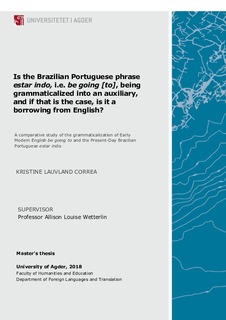| dc.contributor.author | Correa, Kristine Lauvland | |
| dc.date.accessioned | 2018-09-17T11:02:54Z | |
| dc.date.available | 2018-09-17T11:02:54Z | |
| dc.date.issued | 2018 | |
| dc.identifier.uri | http://hdl.handle.net/11250/2562936 | |
| dc.description | Master's thesis English EN501 - University of Agder 2018 | nb_NO |
| dc.description.abstract | The aim of this thesis is to compare the grammaticalization of English be going to and Brazilian Portuguese estar indo (i.e. the equivalent to English be going to) in order to investigate whether the phrase is grammaticalizing in Brazilian Portuguese, and furthermore, to discuss whether the grammaticalization is influenced by English. To discuss these issues, the thesis consults research and corpora that illustrate the use and grammaticalization of the phrase in the two languages.
Data from the BYU corpora and Twitter1 show that Brazilian Portuguese estar indo is used in situations where it appears to be a (purposive) future auxiliary, but it is quite rare and it is not accepted in Standard Brazilian Portuguese. Similar to the use of be going to in Early Modern English, the auxiliary use of estar indo is most frequent with action and/or activity verb collocates (e.g. to work, to buy), but the present thesis has found evidence for estar indo occurring with mental verbs (e.g. to think).
The study also explores whether the grammaticalization of estar indo is a consequence of the global spread of English and its subsequent influence on Brazilian Portuguese, concluding that contact between English and Brazilian Portuguese could have reinforced the use of estar indo, but it is unlikely that estar indo is a direct borrowing from English or that the grammaticalization is triggered by extreme language contact with English. | nb_NO |
| dc.language.iso | eng | nb_NO |
| dc.publisher | Universitetet i Agder ; University of Agder | nb_NO |
| dc.rights | Attribution-NonCommercial-NoDerivatives 4.0 Internasjonal | * |
| dc.rights.uri | http://creativecommons.org/licenses/by-nc-nd/4.0/deed.no | * |
| dc.subject | EN501 | nb_NO |
| dc.title | Is the Brazilian Portuguese phrase estar indo, i.e. be going [to], being grammaticalized into an auxiliary, and if that is the case, is it a borrowing from English? : A comparative study of the grammaticalization of Early Modern English be going to and the Present-Day Brazilian Portuguese estar indo | nb_NO |
| dc.type | Master thesis | nb_NO |
| dc.subject.nsi | VDP::Humaniora: 000::Språkvitenskapelige fag: 010::Engelsk språk: 020 | nb_NO |
| dc.source.pagenumber | 87 p. | nb_NO |

